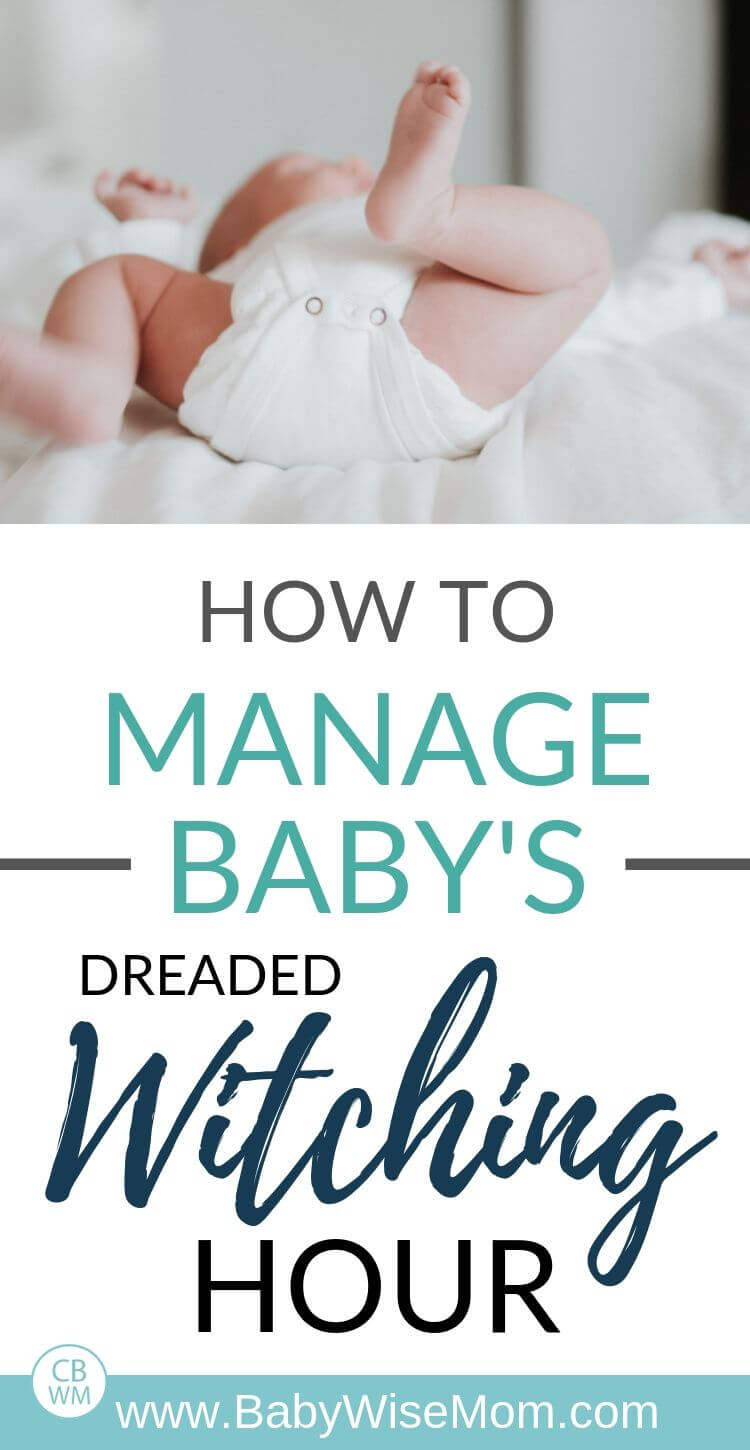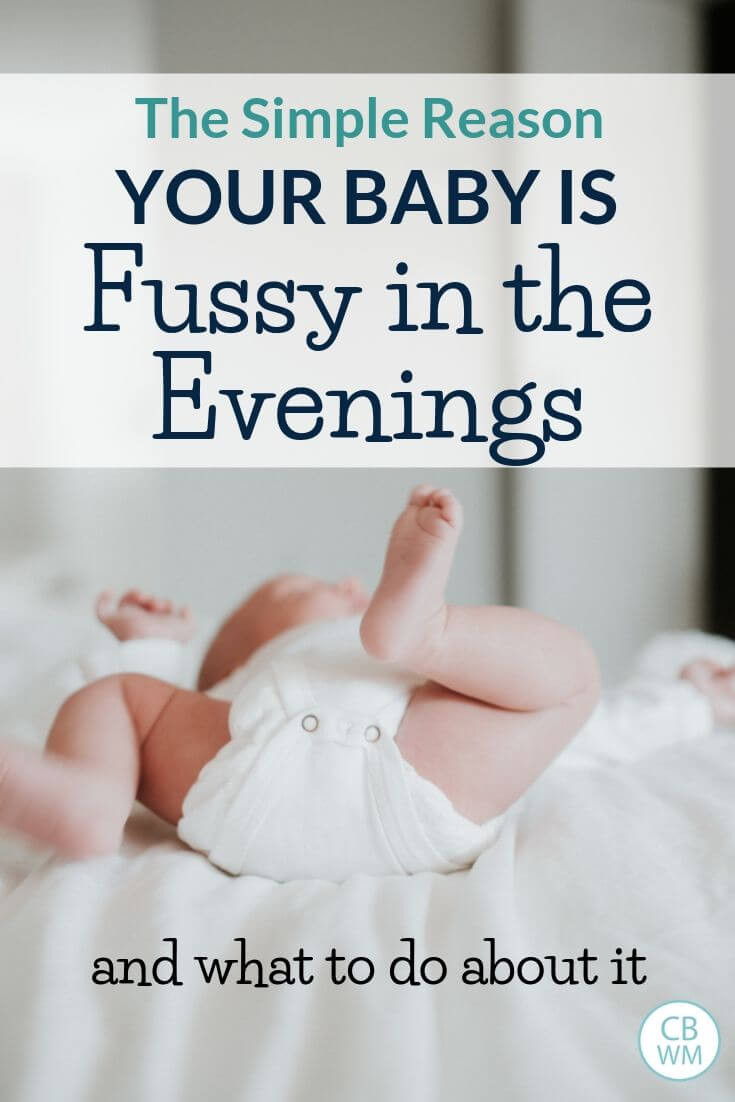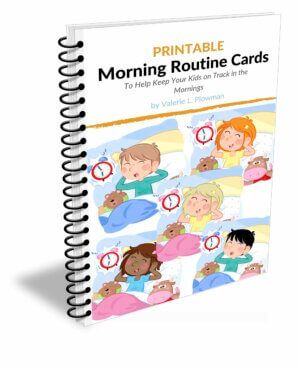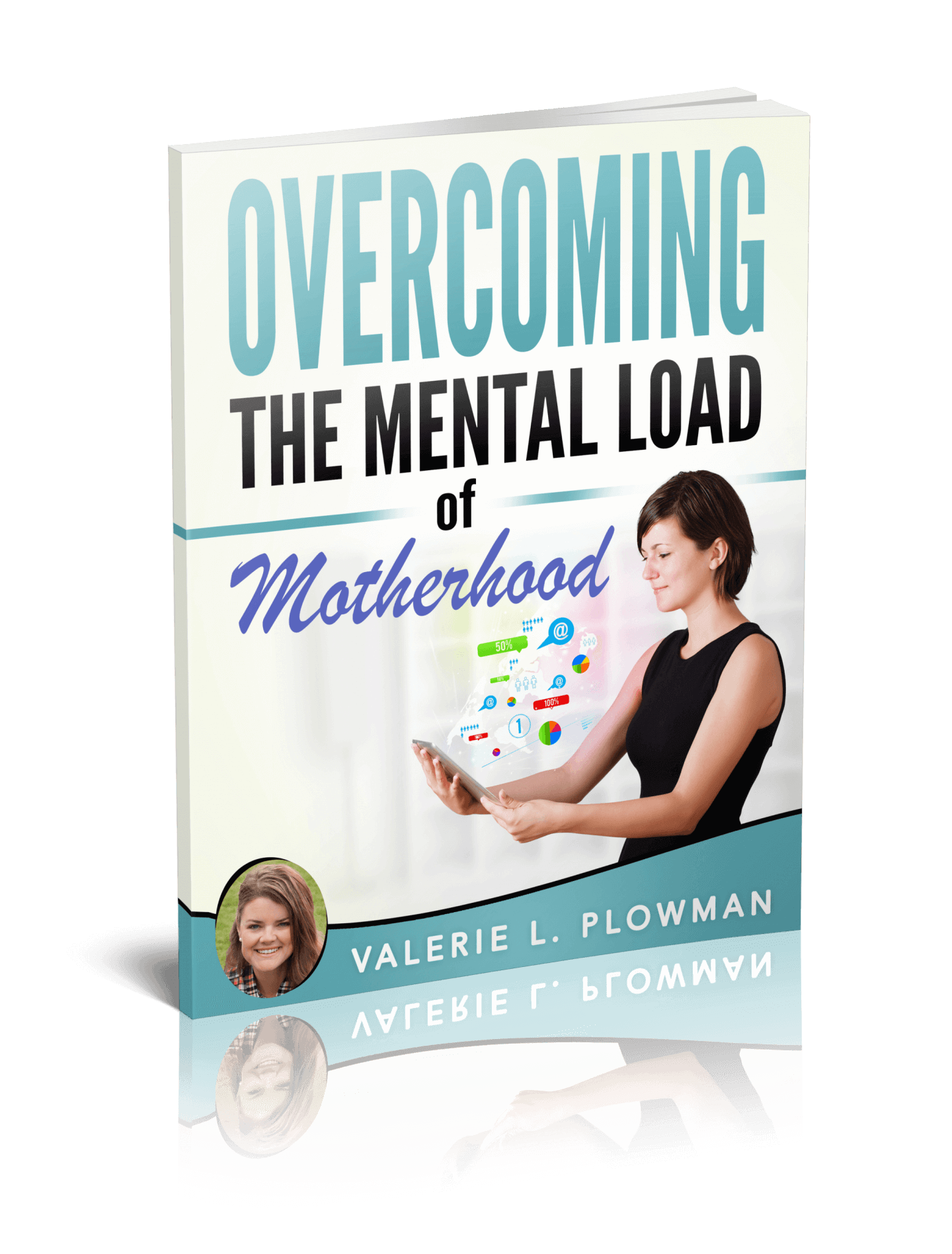Tips to help your witching hour baby through this fussy evening period and help you know how to deal with baby’s witching hour.

By the time you have a third child, you feel like you have a good handle on the whole parenting thing and are sure you can handle anything that comes your way.
Then you quickly learn there is a never-ending depth of curveballs thrown your way as a parent and you will constantly be troubleshooting new issues you have never faced before.
That was how witching hour was for me and my third baby.
My third baby started out super easy and calm. Then one day, she just got fussy in the evenings.
It is not uncommon for a baby to be fussy during the evening hours. This time is often referred to as the “Witching Hour.” Not all babies experience the witching hour; Brayden and Kaitlyn didn’t (at least, Brayden didn’t once we started Babywise).
McKenna, my third baby, however, did.
At first, I didn’t know what was going on. She had previously slept so peacefully.
It hit her around two months old. She just stopped sleeping in the evenings. It was like she was a different baby. It was quite a shock to us and took us a bit to figure out what exactly was happening.
This post outlines the details of witching hour, how to help baby through it, and our personal experience with witching hour.
Post Contents
- WITCHING HOUR FOR A BABY DEFINITION
- SIGNS BABY IS HAVING WITCHING HOUR
- WITCHING HOUR TIMELINE
- When witching hour will start and when witching hour will end?
- What time of day is witching hour?
- WITCHING HOUR CAUSES
- WITCHING HOUR FIXES
- Cluster feed
- Put baby in a sling
- Put baby in a swing or other soothing item (like a bouncer)
- Get baby to sleep
- Find a sleep prop that helps
- Use gas drops and gripe water
- Get out of the house
- Adjust your schedule
- Adjust evening routines
- Avoid Stimulation
- Baby Massage
- Relax your mind and body
- Take turns caring for baby
- Avoid the following
- WITCHING HOUR AND BABYWISE
- WITCHING HOUR IN ACTION
- WITCHING HOUR ENCOURAGEMENT
- Get my eBooks here
- RELATED POSTS
- How To Manage Baby's Witching Hour
- Materials
- Tools
- Instructions
WITCHING HOUR FOR A BABY DEFINITION
The witching hour is a time when an otherwise content baby is very fussy. It will start in the late afternoon or later and go until around 11 PM to midnight.
Witching hour can start as early as 2 weeks old and is typically gone by 4 months old.
This fussy period is not the same as colic. Babies with colic will cry a lot more and outside of the typical witching hour time of day.
SIGNS BABY IS HAVING WITCHING HOUR
I can’t tell you how many people contact me with a question about their baby who will not sleep in the evenings and are having evening fussiness and after a little discussion, we determine it is a classic case of baby witching hour.
Here are some signs your baby is having witching hour:
- Your baby is fussy in the evenings. Your baby who is fine and content all day will suddenly cry or at least be very discontent and you can’t figure out why. This will happen at a similar time of night each night.
- Your baby sleeps well all day long and is happy and content, but in the evening will not sleep. Your baby is a great sleeper in the day but will not sleep in the evening.
- Your baby just seems different. You can’t explain it other than your baby seems different. She isn’t herself.
If you are a new mom and this is your first baby, rest assured your baby will snap out of this and also rest assured that not all babies have a witching hour.
It can be considered normal to have witching hour since it happens to a lot of babies. I like the word “normal” so we know it isn’t necessarily that there is anything wrong. But normal doesn’t mean typical or even common.
WITCHING HOUR TIMELINE
I bet your number one question is how long with this fussy period hang around. Parents want to know what type of timeline they are looking at and how many weeks they will have to endure hearing their baby cry.
When witching hour will start and when witching hour will end?
This fussiness is supposed to start around 2-3 weeks old, peak around 6 weeks old, and end sometime between 3-4 months old.
You are supposed to take into account baby’s due date and not just the birth date.
McKenna didn’t follow this timeline exactly. She started at 8 weeks and ended sometime between 3-4 months old.
What time of day is witching hour?
Witching hour is usually in the early evening into the late night hours. It is most typically between 6-10 PM, but it can be 5 PM to midnight.
That doesn’t mean witching hour will be those entire hours, but that is the time of day it typically falls in.
WITCHING HOUR CAUSES
There is no real known cause of the witching hour. There are, of course, many theories.
Theories include mom having a low milk supply and baby having an immature nervous system.
Both of these theories have flaws; formula-fed babies can also experience the witching hour (so that wouldn’t be low milk supply) and not all babies experience the witching hour (so it can’t be blamed on the nervous system). If it was a nervous system issue, you would think all babies would get it.
So the real answer is that no one knows for sure.
Another common theory is that baby is simply overstimulated by the evening. Keeping a daily schedule is a great way to help prevent overstimulation from happening. If your baby is overstimulated, see my post on How To Calm Your Overstimulated Baby.
On a related note, you might find that your baby is overtired. Any baby who is overtired will be more fussy.
You might find that your fussy baby actually has gastroesophageal reflux disease, also known as GERD. If your baby has reflux, check this post out Babywise and Reflux.
One note, witching hour and colic are two different things. Colic can happen at any point in the day and can last all day. Read up on tips for Surviving Colic from real moms who have been there here. You can also read up on colic from the Mayo Clinic here.

WITCHING HOUR FIXES
You can’t make the witching hour go away, but you can minimalize the difficulty of it on you and your baby.
Cluster feed
Cluster feeding might help your baby calm down. Cluster feeding is feeding your baby every two hours and is a common technique to try to get baby sleeping through the night.
Many times a fussy baby will be calmed by eating, so you can add in an extra feed in the evening routine to keep baby more calm. Read more about cluster feeding here.
This can also help rule out any concern that there is hunger involved.
Put baby in a sling
If your baby will not sleep and will not be consoled, you might find you like to have baby in a sling or baby carrier.
This might calm baby and might even get baby to sleep. You will find this especially helpful if you have older children who need to be taken care of during baby’s fussy period.
Put baby in a swing or other soothing item (like a bouncer)
You might find your baby will calm down in a swing or a baby bouncer. She might even sleep when she is in one of those places. Give it a try.
We want to avoid sleep props, but you have to realize that the things you do during witching hour will not hurt baby’s long-term sleep progress. Baby is not himself. This is a time to do what you need to survive and maintain your sanity.
Get baby to sleep
Many people find success with getting baby to sleep during the typical witching hour. They adjust the evening schedule to have baby asleep before witching hour strikes.
For example, if witching hour always happens at 10:30 PM if baby is awake then, do the dreamfeed and have baby back down before 10:30 PM.
If baby skips witching hour if the dreamfeed is skipped, skip the dreamfeed.
If baby has witching hour at 8:00 PM each night, make sure baby is in bed by 7:30 PM.
The idea is you get baby down and asleep before the time witching hour hits.
I like to swaddle my babies for sleep. Even if you do not swaddle, swaddling during witching hour time period might be helpful.
You might also find the only way your baby will sleep at this time is in your arms. If that is the case, grab a good novel and relax with your baby in the evenings for a while.
>>>Read: What To Do When Baby Takes a Long Time to Fall Asleep
Overtiredness always leads to more fussiness, so getting sleep in is important.
Find a sleep prop that helps
Sleep props are something I typically advise against, but during the witching hour, all bets are off. Feel free to do what works and use what works (you know, and of course is safe for baby).
One note–if you start using sleep props at this time and other naps start to be negatively impacted during the following days, you probably are not having witching hour and are having sleep problems and fussiness for other reasons. Your baby might be having gas pain or could have reflux.
>>>Read: When Sleep Props are Okay (and when to avoid them)
Use gas drops and gripe water
Sometimes a baby seems like they are experiencing witching hour because they have digestive issues. Use some gas drops or grip water to help alleviate minor stomach discomfort and help the belly feel better.
If it seems like there is a tummy or gut concern, consider a food sensitivity or reflux also playing a part in this fussy evening window.
Get out of the house
When my third child had witching hour, we left the house. We would go outside, go for a walk, or go run errands. She would not cry if she was out and about, and my older two children liked getting out.
If your baby will also be pleasant if she is out and about, try getting out to get through this time. The fresh air from a walk can really help!
Adjust your schedule
Be cautious with this one. If your baby has true witching hour, you cannot solve it by switching your baby schedule up.
However, you might be having witching hour-like symptoms that are actually a symptom of the schedule being off. So consider changing the schedule around and give it a try if you feel like it is a good idea.
You might need to change what time of day you get baby up, you might need to change the timing of your other daytime naps, you might need to change your baby wake time length (also known as wake windows).
Do not think that doing longer wake time will help your baby be less fussy. Lack of sleep leads to a fussy baby and sleep begets sleep.
Be aware of sleep cues and respect your baby’s needs.
Adjust evening routines
You might be able to mitigate the extreme nature of the upset baby if you adjust your evening routine. Perhaps a change to the bedtime routine will help. Perhaps adding a bath at this time of day will help. You might need dim lighting or bright lighting (likely dim). Try different things and see if something improves the situation.
Avoid Stimulation
Your baby might do better during witching hour if you can cut out stimulation. Too much stimulation will lead to complete exhaustion.
This means you want keep the environment as dark and quiet as possible.
A white noise machine can help with this if you have older kids or live in a noisy area.
You want to have dim lights, reduced noise, and keep things calm for your baby. This is obviously conflicting with the idea to go outside or get out of the house. Experiment and see what works for your baby.
Baby Massage
A nice infant massage might help your little one to relax.
Relax your mind and body
It is stressful to hear your baby cry. No human being likes to hear a baby cry.
Babies can feel the emotions of their caregivers, so if you want baby to settle down and relax, you need to also. Just remember, this is not a reflection on you at all. You aren’t failing. Baby isn’t failing. This is just something to get through.
Take turns caring for baby
It is hard to care for a baby who is upset. On our hardest days, I found it best if my husband and I took turns attending to a fussy baby. This helps you stay relaxed and calm more easily.
Avoid the following
If you are breastfeeding, do not try to fix the witching hour by supplementing with formula if you hope to continue breastfeeding. Remember, formula-fed babies experience witching hour, too. If you supplement with formula you will only hurt your milk supply in the long run.
Read even more tips on Surviving Witching Hour from real moms who have been through it here.
WITCHING HOUR AND BABYWISE
If your baby is experiencing the witching hour, one of your biggest worries is likely starting a bad habit with your baby sleep schedule.
Your baby is laying in her crib crying, but you don’t want to get her and reinforce crying in order to get out of bed. You want to protect your sleep schedule.
Do not worry about the schedule.
Let me just tell you, don’t worry about it.
If your baby is sleeping well for all other naps, you are not going to ruin anything by getting her during the witching hour. I promise. It is almost like they just don’t even remember this time period. Do not stress about props at all during the witching hour.
You do not want to leave her in her crib during this time to just cry. Cry it out is a process to teach self-soothing for sleep training; having her cry when she just can’t sleep is not teaching her anything. It is just causing stress on the entire family.

WITCHING HOUR IN ACTION
I have discussed our witching hour process in my McKenna newborn summary posts, but I thought I would summarize it here. Anyone experiencing this doesn’t want to wade through three months of newborn summary posts to get the story 🙂
As I said, it started when McKenna was two months old. My husband and I were out on a date and I thought that it was just her reacting to me leaving the house (she always woke up when I left the house). Four days later, she did it again. I was home this time and found it odd. I didn’t know it was the witching hour at this point.
Since she just never cried (unless I left the house), I went to her room to comfort her. I tried rocking her to sleep. No luck. I tried giving her a pacifier in her bed. No luck. She stayed awake for two hours. At that point, I decided to feed her, confident she would at least fall asleep nursing. No luck. Still wide awake.
My husband took turns with me over the next two hours. Finally, it was time for the dreamfeed and I fed her again. She then peacefully went to sleep in her crib. Happily, she didn’t cry that entire time–only if she was not in the company of someone. Also happily, that was the worst night of our witching hour.
Over the next week, she didn’t have the witching hour every night. Some nights she did, some she didn’t. I could really sense if she was having it or not. If she was, I did what it took to put her to sleep or at least keep her happy. If she wasn’t, I put her to bed. Her witching hour was just after her 6 PM feeding. After the 8 PM feeding, she would sleep in her bed.
Here is a list of my personal solutions to get through the witching hour. These things didn’t negatively affect her other daytime naps:
- Cluster Feeding: Previous to the witching hour, McKenna would not cluster feed. She wouldn’t eat if it was sooner than three hours. Once she started witching hour, I started cluster feeding, and she started sleeping longer stretches at night.
- Errands: Our family would just go out and run errands or visit friends rather than try to put McKenna down for a nap. This was nice because we got to do things over the summer months. McKenna would just fall asleep in her carseat or in my arms for a catnap.
- Rock: Sometimes, if I could, I would rock McKenna to sleep and then put her in her bed.
- Pacifier: She liked to suck on a pacifier at this time.
- Swing: Previous to the witching hour, McKenna would not sleep in her swing. We had purchased a new swing before she was born. One day after the witching hour, I had the thought to try our old swing. It worked! She would fuss a bit in it, but she would go to sleep in it for a short nap. This was helpful since her witching hour was around bedtime for Brayden and Kaitlyn.
As time passed, the witching hour was not every day. Sometime between 3-4 months old, the witching hour ended. By five months old, she went to sleep just fine in her bed each night.
A note, if McKenna were my only child, I wouldn’t have a problem holding her for her short catnap to get her through the witching hour. Having two older (but young–only barely turned 2 and barely turned 4) children made it necessary for me to turn to something like the swing so I could still attend to my older children at bedtime.
Need nap help? Get The Babywise Mom Nap Guide: How to establish successful naps from birth through the preschool years
WITCHING HOUR ENCOURAGEMENT
If your baby is experiencing the witching hour, don’t stress out. It will not last forever. It is a very difficult time. You are not being dramatic. It is hard.
Also, don’t be afraid to comfort your baby. It does not go against Babywise to do so. Trust me on this; I communicate with the authors 🙂 They do not advocate leaving a baby crying and helpless in bed. A baby experiencing the witching hour is not going to benefit from a cry it out session.
Do what it takes to keep baby happy during this time. Do what it takes to get baby to sleep during this time so she doesn’t get overly tired and overstimulated. It will all be okay.
Get my eBooks here
RELATED POSTS
- Colic: Reasonable Sleep Expectations
- Common Reasons for Poor Sleep
- What To Do When Your Baby is Taking Short Naps
This post originally appeared on this blog June 2019.

How To Manage Baby's Witching Hour
Tips to help your witching hour baby through this fussy evening period and help you know how to deal with baby's witching hour.
Materials
- Varies based on solution used
Tools
- Patience
Instructions
- Cluster Feed: feed baby every 2 hours or so
- Baby Carrier: use a sling or baby carrier
- Use a Swing: put baby in a swing to calm down
- Sleep: time naps or bedtime so baby sleeps over witching hour
- Sleep Props: use them during witching hour if it helps
- Get Out: go for a walk, run errands, etc.
- Shift the Schedule: see if a schedule change helps things
- Infant Massage: do some massage to relax baby





